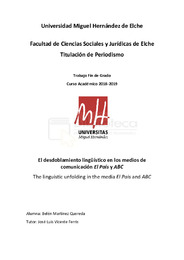Por favor, use este identificador para citar o enlazar este ítem:
https://hdl.handle.net/11000/7630Registro completo de metadatos
| Campo DC | Valor | Lengua/Idioma |
|---|---|---|
| dc.contributor.advisor | Vicente Ferris, José Luis | - |
| dc.contributor.author | Martínez Quereda, Belén | - |
| dc.contributor.other | Departamentos de la UMH::Ciencias Sociales y Humanas | es |
| dc.date.accessioned | 2021-05-05T16:53:25Z | - |
| dc.date.available | 2021-05-05T16:53:25Z | - |
| dc.date.created | 2019-06 | - |
| dc.date.issued | 2021-05-05 | - |
| dc.identifier.uri | http://hdl.handle.net/11000/7630 | - |
| dc.description.abstract | La lucha por la igualdad entre hombres y mujeres es una cuestión que lleva muy presente en nuestra sociedad desde hace muchos años, incluso más de los que pensamos. Actualmente, el feminismo es una tendencia que ha alcanzado una fuerza incalculable, pues todas sus reivindicaciones se centran en conseguir la igualdad entre hombres y mujeres en todos los aspectos de la vida, ya sean laborales, sociales y, por supuesto, en el lenguaje. El principal objetivo de este Trabajo de Fin de Grado es analizar en qué postura se encuentran dos de los grandes medios de comunicación más influyentes en el panorama mediático español, como lo son: El País y ABC en cuanto al desdoblamiento lingüístico, así como observar si la tendencia ideológica, es decir, la línea editorial de cada medio de comunicación influye a la hora de posicionarse a favor o en contra del lenguaje inclusivo. En la introducción, centrada en reflejar la situación de la mujer antes y después de la democracia, ayudará al lector a poder contextualizar el tema y a realizar un breve resumen de la historia de las mujeres en España. A continuación, en el estado de la cuestión, donde se define qué es el desdoblamiento lingüístico y las diferentes posturas, tanto a favor del desdoblamiento como en contra, y cuáles son sus propuestas para acabar con la desigualdad lingüística y sus críticas. Tras haber dado las primeras pinceladas del desdoblamiento lingüístico, encontramos la parte más importante de este trabajo, el método, donde se realiza el análisis de ambos medios de comunicación anteriormente mencionados. Para ello, se han seleccionado un total, respectivamente, de 35-55 artículos de cada medio. Todos se han localizado en la versión digital al colocar en el buscador las palabras: desdoblamiento lingüístico. Durante el análisis se han seleccionado diferentes piezas informativas, como son: artículos de opinión, tribunas, noticias y entrevistas. Posteriormente, encontramos los resultados, es decir, la comparación de ambos medios, y por último las conclusiones, donde se le dará respuesta a la hipótesis planteada al inicio de este TFG y otras cuestiones extraídas tras todo lo desarrollado anteriormente. | es |
| dc.description.abstract | The struggle for equality between men and women is an issue that has been very present in our society for many years, even more than we think. Currently, feminism is a trend that has achieved an incalculable force, because all its claims are focused on achieving equality between men and women in all aspects of life, be it labor, social, and of course, in language. The main objective of this Final Degree Project is to analyze the position of two of the most influential media in the Spanish media scene, such as: El País and ABC regarding linguistic unfolding, as well as observing whether the ideological tendency, that is to say, the editorial line of each means of communication influences when positioning itself for or against inclusive language. In the introduction, focused on reflecting the situation of women before and after democracy, it will help the reader to contextualize the topic and make a brief summary of the history of women in Spain. Then, in the state of the question, where is defined what is the linguistic split, and the different positions both in favor of splitting and against and what are their proposals to end linguistic inequality and criticism. After having given the first brushstrokes of linguistic unfolding, we find the most important part of this work, the method, where the exhaustive analysis of both aforementioned media is carried out. For this, a total of 35-55 articles of each medium have been selected. All have been located in the digital version by placing in the search engine the words: linguistic unfolding. During the analysis, different informative pieces have been selected, such as: opinion articles, forums, news and interviews. Later, we find the results, that is, the comparison of both means, and finally the conclusions, where we will respond to the hypothesis raised at the beginning of this TFG and other questions extracted after everything developed previously. | es |
| dc.format | application/pdf | es |
| dc.format.extent | 32 | es |
| dc.language.iso | spa | es |
| dc.rights | info:eu-repo/semantics/openAccess | es |
| dc.subject | desdoblamiento | es |
| dc.subject | unfolding | es |
| dc.subject | lenguaje | es |
| dc.subject | igualdad | es |
| dc.subject | El País | es |
| dc.subject | ABC | es |
| dc.subject | language | es |
| dc.subject | equality | es |
| dc.subject.other | CDU::0 - Generalidades.::070 - Periódicos. Prensa. Periodismo. Ciencias de la información | es |
| dc.title | El desdoblamiento lingüístico en los medios de comunicación El País y ABC | es |
| dc.title.alternative | The linguistic unfolding in the media El Pais and ABC | es |
| dc.type | info:eu-repo/semantics/bachelorThesis | es |

Ver/Abrir:
TRABAJO DE FIN DE GRADO - BELÉN MARTÍNEZ QUEREDA.pdf
1,16 MB
Adobe PDF
Compartir:
 La licencia se describe como: Atribución-NonComercial-NoDerivada 4.0 Internacional.
La licencia se describe como: Atribución-NonComercial-NoDerivada 4.0 Internacional.
.png)